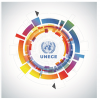News
Displaying Results 51 - 75 of 91
If the world is to deliver on climate change and attain the 2030 Agenda for Sustainable Development objectives, we must optimize our endowments of natural resources. A resilient and sustainable supply of natural resources, including critical raw minerals, is essential for sustainable energy,…
Since its independence, Armenia has been one of the fastest-growing economies among the countries in Eastern Europe and South Caucasus (EESC) with GDP growth averaging 6 percent during the last two decades. Fueled by substantial reforms and increased foreign investment, the country embarked on a…
Embracing sustainable infrastructure that is green, circular, inclusive, resilient and fiscally sustainable, is necessary to stay on track to achieve the Sustainable Development Goals (SDGs) by 2030.
The UNECE People-first PPP Evaluation Methodology for the SDGs can support Governments in this…
Complex global value chains include production facilities scattered all over the world. Sometimes, they may also involve practices of illegitimate subcontracting and undeclared informal work. In fact, their complexity and opacity make it very hard to gain accurate information about how and where…
UNECE is leading a large and diverse group of international experts carrying out the 55th Environmental Performance Review (EPR) since the establishment of the UNECE EPR Programme, 25 years ago. Azerbaijan has requested UNECE to review its environmental performance for a third time. To provide the…
Transitioning towards a knowledge-based economy away from a resource-intensive model of economic growth is central for sustainable development among the seven countries of the UN Special Programme for the Economies of Central Asia (SPECA) - Afghanistan, Azerbaijan, Kazakhstan, Kyrgyzstan,…
As world leaders gather in Glasgow for COP 26, there is increasing recognition that the transition to renewable energy is vital to tackle climate change. The circular economy aims at sustainable production, consumption and resource use by minimizing pollution, turning waste products into productive…
As all eyes turn to Glasgow where world leaders have gathered at COP26 for crucial negotiations to cut greenhouse gas (GHG) emissions and limit global warming, UNECE experts highlight how improved transparency and traceability could be part of the solution. The private sector has a vital role to…
The Group of 7 nations (G7), six of which are UNECE member States (Canada, France, Germany, Italy, the UK and the US), took bold step towards reducing barriers to trade by agreeing on the principles to govern cross-border data use and digital trade. At their meeting in London on 22 October,…
The progress of the 2030 Agenda for Sustainable development hinges on the availability of natural resources and a transition to sustainable means of their production and use. Minerals and petroleum provide the raw materials needed for the economy. While a low-carbon economy requires a wide variety …
UNECE is making a call to the World of Sports, including sports events’ organizers, committees, athletes, sportswear brands, producers and consumers to help advance circularity and sustainability in sports clothing.
The Forests4Fashion Sports Challenge aims to encourage the reuse of sportswear…
Realization of the Sustainable Development Goals will require massive inputs of low-carbon energy, critical raw materials, and other natural resources, including land and water. These demands are aggravated by rapid urbanization of the world’s population, which stresses grid-based power,…
In a joint statement, the Executive Secretaries of the United Nations Regional Commissions have called for enhanced regional cooperation to develop nature-based and technological solutions for capturing CO2 emissions from the atmosphere and ensuring its long-term storage. Version française
This…
The COVID-19 pandemic has exposed the world’s fragilities, including the weaknesses of our food systems which exacerbate hunger, obesity, poverty, political instabilities and economic crises. To overcome common and regional challenges, the five UN regional commissions have been working jointly on…
With the UN Food Systems Summit taking place next week under the auspices of the UN General Assembly (23 September 2021), we must recognize that the food systems we have built over recent decades are unsustainable. The food choices we make every day as consumers and producers of food are having a…
August is wildfire season in many parts of the Northern Hemisphere. Many areas in the UNECE region, including North America, Siberia, and Mediterranean countries have experienced unusually hot and dry weather this year, and with that some of the biggest wildfires on record. Areas burned in Turkey…
A coordinated response is necessary for promoting and implementing the circular economy agenda globally. Concrete commitments from governments, businesses, international organizations, civil society and other stakeholders will be key to building the sustainable, resilient and low-carbon economy…
By Ms. Olga Algayerova, UN Under-Secretary-General and Executive Secretary of UNECE, and Ms. Elisabete Quintas da Silva, Head of Department, Sustainable and Efficient Use of Resources Operational Programme, Government of Portugal, and Chair of the UNECE Committee on Environmental Policy.
This…
Integrated management of water, energy and land resources, while protecting ecosystems, remains a substantial challenge in the Western Balkans. The Water-Food-Energy-Ecosystems (WEFE) Nexus approach offers solutions that can reconcile potentially conflicting interests as they compete for the same…
The extraction of raw materials worldwide has more than doubled since 1990 and could double again by 2060 in the absence of corrective policies. According to the UN International Resources Panel, resource extraction and processing account for 90% of global biodiversity loss and water stress impacts…
UNECE continues to help its member States to respond to COVID-19 crisis. As part of this work, Guidelines and Best Practices for Micro-, Small and Medium Enterprises in Delivering Energy-Efficient Products and in Providing Renewable Energy Equipment developed earlier are being customized for North…
The Government of Ukraine is currently implementing a broad policy agenda aimed at achieving the Sustainable Development Goals (SDGs) and pursuing a resilient, inclusive and sustainable post-COVID recovery. UNECE, together with UNDP, UNICEF and WHO, is supporting these efforts through a Joint…
While consumer demand for sustainable goods is an important driver for change, regulation and policy change are essential if the world is to side-step a climate catastrophe and bend traditional linear economic models towards a circular economy and sustainable future. Until recently it wasn’t clear…
The 56 countries of the UNECE region, spanning from North America to Europe, the Balkans, the Caucasus and Central Asia, are major users and producers of natural resources. Efficiency in the domestic use of resources continues to increase in the region, but the overall material footprint, which…
Systemic deficiencies with regard to access to information, decision-making or compliance with environmental law can seriously threaten successful implementation of circular and green economy and sustainable development. Taking a case to court to advance a widely shared public interest remains an…


























